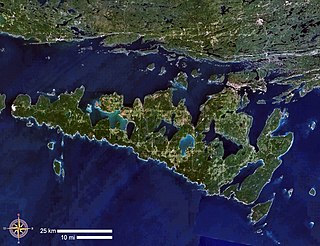
Manitoulin Island is an island in Lake Huron, located within the borders of the Canadian province of Ontario, in the bioregion known as Laurentia. With an area of 2,766 km2 (1,068 sq mi), it is the largest lake island in the world, large enough that it has over 100 lakes itself. In addition to the historic Anishinaabe and European settlement of the island, archaeological discoveries at Sheguiandah have demonstrated Paleo-Indian and Archaic cultures dating from 10,000 BC to 2,000 BC.
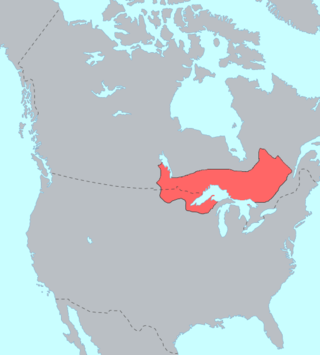
The Ojibwe, Ojibwa, Chippewa, or Saulteaux are an Anishinaabe people in what is currently southern Canada, the northern Midwestern United States, and Northern Plains. They are Indigenous peoples of the Subarctic and Northeastern Woodlands.

Georgian Bay is a large bay of Lake Huron, in the Laurentia bioregion. It is located entirely within the borders of Ontario, Canada. The main body of the bay lies east of the Bruce Peninsula and Manitoulin Island. To its northwest is the North Channel.

The Mississaugas are a group of First Nations peoples located in southern Ontario, Canada. They are a sub-group of the Ojibwe Nation.
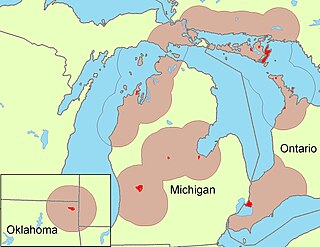
The Odawa, believed to derive from an Anishinaabe word meaning "traders", are an Indigenous American ethnic group who primarily inhabit land in the Eastern Woodlands region, commonly known as the northeastern United States and southeastern Canada. They have long had territory that crosses the current border between the two countries, and they are federally recognized as Native American tribes in the United States and have numerous recognized First Nations bands in Canada. They are one of the Anishinaabeg, related to but distinct from the Ojibwe and Potawatomi peoples.
Saugeen First Nation is an Ojibway First Nation band located along the Saugeen River and Bruce Peninsula in Ontario, Canada. The band states that their legal name is the "Chippewas of Saugeen". Organized in the mid-1970s, Saugeen First Nation is the primary "political successor apparent" to the Chippewas of Saugeen Ojibway Territory; the other First Nation that is a part of Chippewas of Saugeen Ojibway Territory is Cape Croker. The Ojibway are of the Algonquian languages family. The First Nation consist of four reserves: Chief's Point 28, Saugeen 29, Saugeen Hunting Grounds 60A, and Saugeen and Cape Croker Fishing Islands 1.
The Anishinabek Nation, also known as the Union of Ontario Indians, is a First Nations political organization representing 39 member Anishinabek Nation First Nations in Canada in the province of Ontario, Canada. The organization's roots predate European contact in the 16th century, in the Council of Three Fires. The Union of Ontario Indians was incorporated in 1949 to serve as a political advocate and secretariat for the Anishinabek First Nations. The Anishinabek peoples speak Anishinaabemowin and Lunaape within the Anishinabek Nation territory in Ontario. In 2017, the Council changed its identification using the name "Union of Ontario Indians" only for legally-binding agreements but for all other purposes referred to themselves as Anishinabek Nation. The head office for the Union of Ontario Indians is located at Nipissing First Nation near North Bay, Ontario.

The Wiikwemkoong First Nation is a First Nation on Manitoulin Island in Northern Ontario. The Wiikwemkoong Unceded Territory is the First Nation reserve in the northeast of Manitoulin Island in Manitoulin District, Ontario, Canada. Wiikwemkoong is an unceded Indigenous reserve in Canada, which means that it has not "relinquished title to its land to the government by treaty or otherwise."
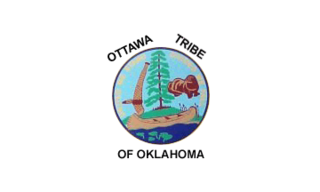
The Ottawa Tribe of Oklahoma is one of four federally recognized Native American tribes of Odawa people in the United States. Its Algonquian-speaking ancestors had migrated gradually from the Atlantic coast and Great Lakes areas, reaching what are now the states of Michigan and Ohio in the 18th century. In the late 1830s the United States removed the Ottawa to west of the Mississippi River, first to Iowa, then to Kansas in what was Indian Territory. Following the United States Civil War, in 1867 they sold their land in Kansas to move again, to purchase land in another section of Indian Territory, in what would become northeast Oklahoma. They were authorized by Congress to buy land from the Quapaw, the predominant tribe in this area.

Zhiibaahaasing First Nation is a First Nation band government in the Canadian province of Ontario. It is a member of the United Chiefs and Councils of Manitoulin.

M'Chigeeng First Nation, also known as West Bay, is an Ojibwe First Nation band government in the Manitoulin District of Ontario, Canada. The total registered population as of December 2018, was 2623 people, of which their on-reserve population was 939. The First Nation have reserved for themselves the 3094.7 ha M'Chigeeng 22 Indian Reserve located on Manitoulin Island.
Manitoulin Secondary School, is a secondary school located on M'Chigeeng First Nation, Ontario, on Manitoulin Island, and is approximately 2 hours from downtown Sudbury.

Rainbow Country is a local services board in the Canadian province of Ontario. It encompasses and provides services to the communities of Whitefish Falls and Willisville in the Unorganized North Sudbury District and Birch Island and McGregor Bay in the Manitoulin District.
Kenjgewin Teg is an Aboriginal-owned and controlled post-secondary institution at M'Chigeeng First Nation, on Mnidoo Mnising Manitoulin Island, Ontario, Canada. In the Ojibwe language, Kenjgewin Teg means a place of knowledge.

Anishinabe Spiritual Centre is a Roman Catholic centre for Ignatian spirituality and training in ministry run by the Society of Jesus in Espanola, Ontario, specifically for the local First Nation people in the area. It is situated to the south of Espanola, on the shore of Anderson Lake, just off Ontario Highway 6. Since it was founded, it has been the only place in northern Ontario that has offered Roman Catholic ministerial training to Aboriginal peoples in Canada.
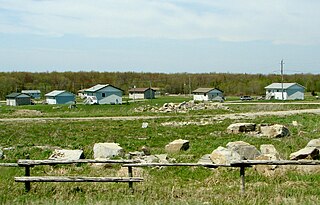
Aundeck Omni Kaning First Nation is an Ojibway First Nation on Manitoulin Island, with their reserve at Sucker Creek 23. The First Nation is a member of the United Chiefs and Councils of Manitoulin and the Anishinabek Nation. They were formerly known as the Ojibways of Sucker Creek.
Whitefish River First Nation is an Ojibwe First Nation in Manitoulin District, Ontario. It is a member of the United Chiefs and Councils of Manitoulin. Its reserve is located at Whitefish River 4.

The Thirty Thousand Islands are the world's largest freshwater archipelago, and are located mainly along the east side of Georgian Bay, part of the Great Lakes, in Ontario, Canada.
Autumn Peltier is an Anishinaabe Indigenous rights advocate from the Wiikwemkoong First Nation on Manitoulin Island, Ontario, Canada. She was named Chief Water Commissioner for the Anishinabek Nation in 2019. In 2018, at the age of thirteen, Peltier addressed world leaders at the United Nations General Assembly on the issue of water protection.